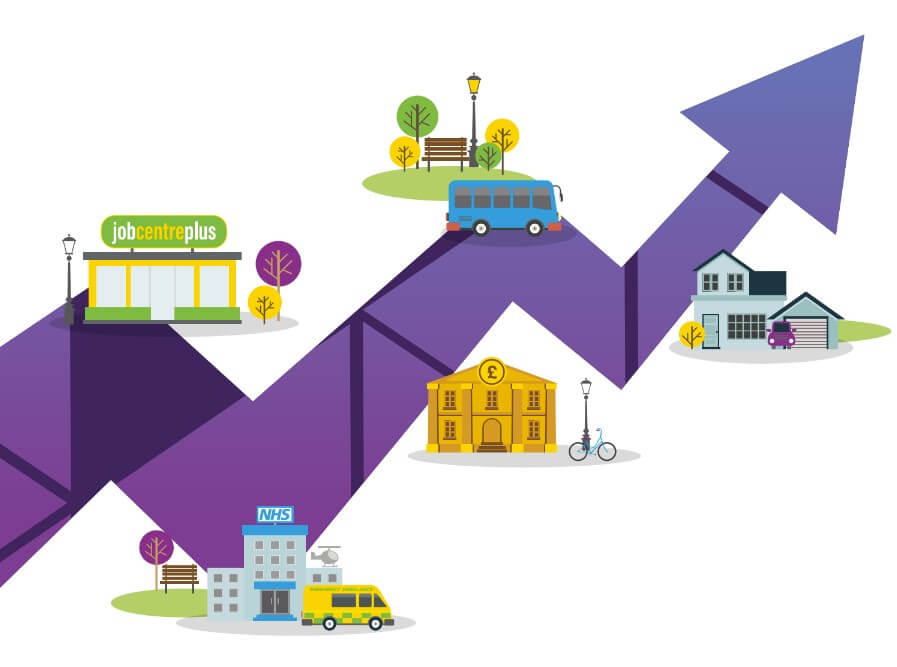
Becca Stacey, Senior Research Officer, Money and Mental Health Policy Institute
Why the next government needs to ‘level up’ for people with mental health problems
12 July 2022
Boris Johnson’s government may be nearing its end, but the commitment to ‘level up’ people and communities across the UK who have been ‘left behind’ is more important than ever. Our new report published today reveals that existing levelling up plans have so far failed to address – or even recognise – the stark inequalities that people with mental health problems experience in many parts of the UK. In particular, our research highlights ‘inequality hotspots’, including Northern Ireland and the North West, where the economic gap between people with mental health problems and the wider population is particularly worrying.
There is an opportunity for the next Prime Minister to be the one that closes these gaps and delivers for people with mental health problems. In the meantime, there are also opportunities for local leaders to act and reduce the inequalities faced by people with mental health problems in their area. Our report calls for both of these forces to come together to build a UK where people with mental health problems can thrive wherever they live.
The UK’s mental health inequality hotspots
People with mental health problems are being left furthest behind in Northern Ireland and the North West. In Northern Ireland, people with mental health problems are 20 percentage points more likely to be struggling to keep up with bills and credit repayments compared to the wider population (72% versus 52% respectively), and in the North West, 18 percentage points more likely. This is in comparison to the West Midlands and London where that gap is much smaller – just 6 percentage points.
The fact that in some parts of the UK people with mental health problems can expect better outcomes shows these disadvantages are not inevitable. In our research, we’ve seen how, by providing the right opportunities and support, places can help people with mental health problems to be healthier, both financially and mentally.
Why are some places more unequal than others?
There is a toxic cocktail of factors – including poor employment opportunities, high living costs and limited access to vital support like mental health services and debt advice – driving these inequality hotspots:
Employment: Places like Northern Ireland and Wales appear to be less successful in supporting people with mental health problems to find and stay in work. In these places, the employment rate of people with mental health problems is over 40 percentage points lower than that of people without such conditions, compared to less than 25 percentage points in the East and South East of England. In many places, struggling to access adequate employment support is a key barrier to finding good work.
“I live relatively near a large industrial estate. All benefit based employment support seems to consist of pushing people into full time physical roles at local factories, no matter whether it’s suitable. There is no support locally for access to training, education, working from home etc.” Expert by experience
Living costs: The cost of key services in an area can contribute to or alleviate financial worries, with many people with mental health problems struggling to access affordable and good quality housing.
“Private rents are extortionate for sometimes poorly maintained or unsafe properties and there’s no chance of getting a council property.” Expert by experience
People also told us of the financial burden high council tax charges coupled with limited Council Tax support cause, and how patchy and expensive public transport leaves them with fewer choices for jobs, shopping and the activities that help us stay well mentally.
Getting support: When we experience money and mental health problems, getting support – such as accessible mental health treatment, assistance from financial services and debt advice – can be a lifeline. Despite this, the availability of services varies widely. For example, wait times for primary mental health services like talking therapies range from 12 days in East Yorkshire to 153 days in Barnsley, with the inability to access timely support often having a financial impact.
“Feel that speedier treatment would have nipped my symptoms in the bud and enabled me to keep working. Became so unwell I haven’t worked for 6 years.” Expert by experience
How to level-up the UK’s mental and financial health
Our research makes clear that the next Prime Minister must revamp plans for levelling up so they deliver for people with mental health problems, by implementing a series of targeted actions that tackle the challenges this group face. These include: introducing more specialist employment support for people with mental health problems, increasing the share of funding for genuinely affordable housing while reducing the discrepancy between private rents and housing support, and making people with mental health problems eligible for all concessionary travel schemes.
Local leaders also have an important role to play in tackling specific issues in their areas which are putting people with mental health problems at greater risk of financial difficulty. This could include: steps to make jobs and housing more accessible to people with mental health problems, improving the generosity and accessibility of Council Tax Support schemes, and measures to make local mental health and money advice services more joined-up.
To find out more about what different actors at the national, devolved and local level can do to level-up the UK’s mental and financial health, you can read our full report, No one left behind, here.
